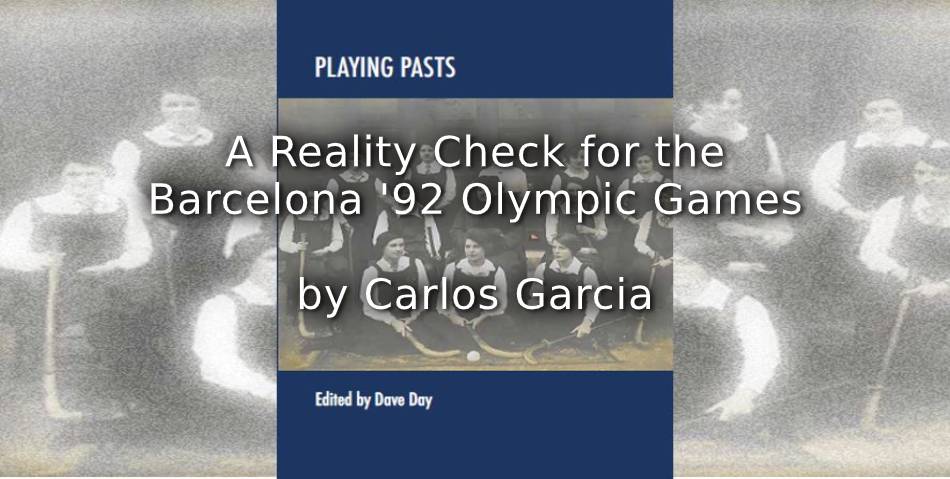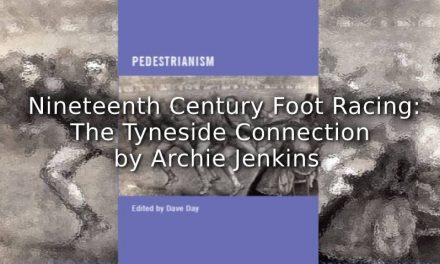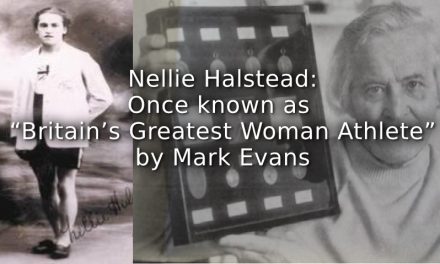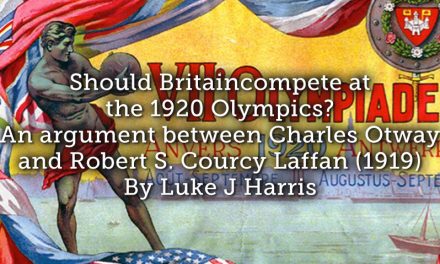Please cite this article as:
Garcia, G. A Reality Check for the Barcelona 92 Olympic Games, In Day, D. (ed), Playing Pasts (Manchester: MMU Sport and Leisure History, 2020), 106-119.
ISBN paperback 978-1-910029-56-5
Chapter 6
______________________________________________________________
A Reality Check for the Barcelona 1992 Olympic Games
Carlos Garcia
______________________________________________________________
Abstract
Over the years, the Barcelona 1992 Olympic Games have simultaneously become a founding myth of Spanish democracy and Spanish sport and the paradigmatic example of an Olympics Games with a positive legacy. After almost thirty years since its celebration, the time may have come to analyse to what extent this myth corresponds to reality. To do this, we will first analyse the different levels in which it has operated: as an example of the economic modernization of the country; as evidence of the democratic consensus in Spain; as a success story of elite sports policy; and as an example of urban renewal. The subsequent critical analysis will try to make emerge those aspects that the myth omits or hides. It is not about denying the positive aspects of those games, but to help clarify the debates about the sustainability of the main sports mega-event on the planet.
Keywords: Olympic Games, Spain, Barcelona 1992, Sports Policy, Doping.
Introduction
The Barcelona 1992 Olympic Games constitute one of the most important moments in Spanish history. They are considered a milestone in the process of modernization and democratization initiated after the death of the dictator Francisco Franco, and, at the same time, a moment of widespread consensus and optimism in Spanish society. The organizational and sporting success of the Games has become a key feature in the country’s official memory, and for many Spaniards the Barcelona Games were the best Games in history and they continue to be so today.
Although the rest of the world does not necessary share that impression, especially not those countries who have also organized other Olympic Games, there is a certain international consensus about the success of Barcelona’s Olympic legacy.[1] Compared to the ruin that was for Greece resulting from the 2004 Olympic Games or the abandoned facilities of Rio 2016, everyone seems to agree that the proof that hosting the Olympic Games can have a long-term positive impact for a city and a country are precisely the Games of 1992. Moreover, the Barcelona Games were the first ones held without a political boycott since 1972 and were surrounded by the historical optimism brought by the fall of the Berlin Wall and the end of the Cold War.
In any case, these Games represented a huge boost in visibility and global awareness of the city and the country, with the consequent increased expansion of urban and cultural tourism – and not only sun and beach tourism – and allowed a transformation of Barcelona into the open, cosmopolitan, service leaning city glowing in the happy days of globalization. However, just as globalization is a notion in crisis after the rise of so-called populisms and the resurgence of trade wars, perhaps it is also a good time to take stock of the impact of Barcelona 92 on Spanish society and its role as a hinge between a backward and reactionary Spain and a modern and cosmopolitan Spain.
Barcelona 1992 Myth: The best Olympics ever!
Before putting into question the myth of the Olympic Games in Barcelona, we must be familiar with it. This myth is based on four great and interrelated successes: the organizational success, the political consensus over the Games, the sporting triumphs of the Spanish team, and the urban legacy for the city. The four converge on a fundamental appreciation of Spanish twentieth century politics: the secular lag in the modernizing process suffered by Spain since the XIX century was only overcome with the arrival of democracy in 1978.
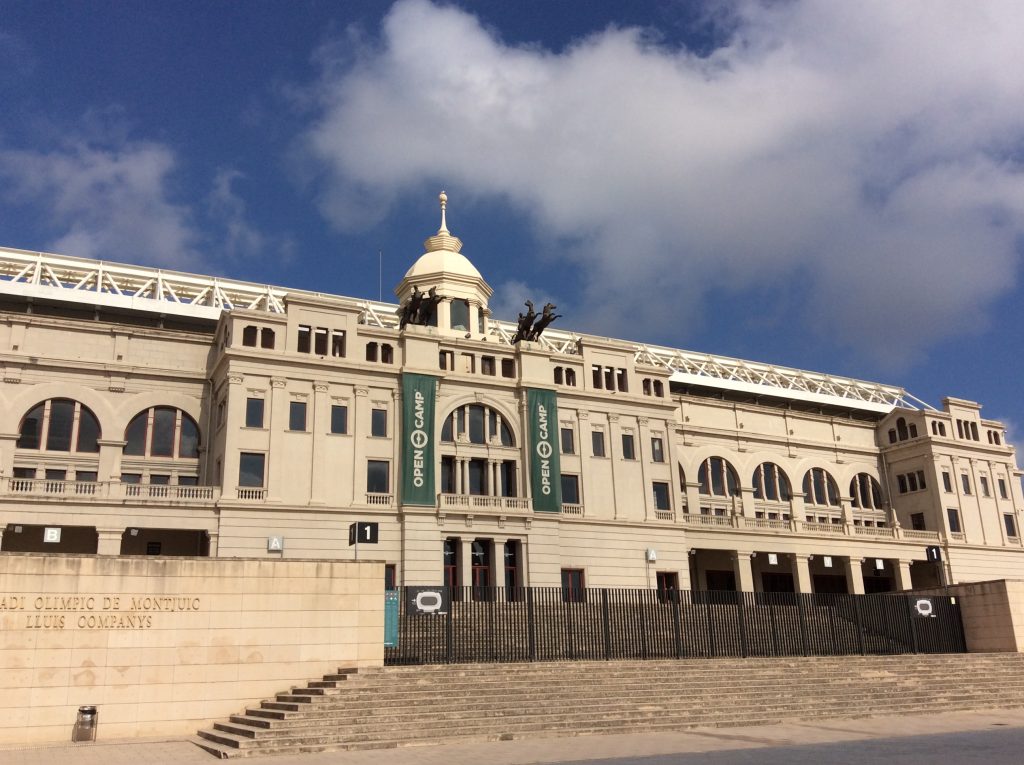
Barcelona Olympic Stadium facade
Photo credit – Margaret Roberts
Organizational success
The organization of the Barcelona 1992 Olympic Games was an undisputable success. Although for a long time there were doubts about whether the facilities would be built on time, the truth is that when the time came they were all ready.[2] The opening ceremony also took place smoothly, and there were no major problems with accommodation, nor with press services or infrastructures for athletes.
The symbolic content of the opening ceremony – which has been analysed elsewhere[3] – turned out to be, above all, an intelligent way of overcoming the political antagonisms of the moment – especially the potential clash between the Spanish and the Catalonian nationalisms – by redefining a concept of mediterraneanity adapted to the incipient postmodernity.
The key element of the ceremony was the choice of the artistic direction, which was bestowed to the theatre group La Fura Dels Baus. It was a multidisciplinary company of great prestige among the artistic avant-garde for its multimedia installations, the quality of its artistic design and for involving the public in its representations, breaking with the so-called fourth wall. There was a clear intention to associate the country with the international artistic vanguard. A decision very similar to that of the official song of the Games: a duet between the Barcelona opera singer Montserrat Caballé and the leader of Queen and pop megastar Freddy Mercury. That is, a representative of high culture, perhaps the furthest image from the widely extended idea of Spain’s flamenco and tapas, along with one of the most famous pop singers in the world, someone completely removed from any traditionalism. The discourse was clear: Spain was no longer a conservative, Catholic and backward country, but a young, liberal, creative and global democracy.
This discourse connected with a deep intellectual and political tradition that went back at least until the end of the nineteenth century. In 1898, Spain lost its last colonies, Cuba and the Philippines, unleashing a deep political and institutional crisis that had its reflection in the intellectual world. For many of the Spanish intellectuals and writers of the time the defeat showed the Spanish backwardness, compared to the rest of Western powers, produced by its intellectual isolation and the dominant presence of the Catholic Church in the political arena. The solution, proposed by the most reputable Spanish intellectual of the time, was Europe. For Ortega y Gasset, Spain was losing the train of modernization and had to open up to the European intellectual and scientific currents if it did not want to stay behind forever.[4]
The idea that Spain had not had a process of modernization comparable to that of the rest of European nations, and that this industrial, political and social backwardness was an anomaly in Europe that explained its internal problems, became the strongest narrative to explain the nineteenth and the twentieth centuries in Spain.[5] Hence, when democracy was restored after the death of Franco, the objective of the political elites was not only to recover democracy, but to recover it as a tool for pending modernization. Therefore, the greatest political success of those early years of democracy was the entry into the European Economic Community in 1986. No wonder that the main television satirical program of that time was titled ‘Ya semos europeos’, ‘We are finally Europeans’.[6]
Political consensus
The Barcelona 1992 Olympic Games had from its origin a political tension between competing political parties and administrations.[7] The Games were taking place in Barcelona, the capital of Catalonia, a historical region with its own identity and governed by Convergència i Unió (CiU), a Catalan nationalist alliance of conservatives and Christian Democrats with a charismatic leader, Jordi Pujol, who was developing a policy of national affirmation. On the national level, the Spanish Socialist Workers Party (PSOE) had governed Spain since 1982 with an absolute majority. Led by the political star of the time, Felipe González, they combined a social democratic accent on social policy – education and health system improvements – and a socio-liberal economic policy – market-friendly reforms, industrial reconversion and public companies privatizations – benefiting from a society yearning to break with the Franco regime. Finally, the Catalan branch of the PSOE, the Socialist Party of Catalonia (PSC) governed Barcelona, the mayor being another charismatic figure who swept the elections, Pascual Maragall.
The years leading up to Games were a constant tug of war between the three administrations to monopolize the political gains of the operation and to control the symbolic projection of the event according to their interests. Disputes over the Organizing Committee of Barcelona 92 (COOB) followed one after another, but always with exquisitely democratic manners.[8] This, in a country whose biggest trauma had been a civil war and a subsequent forty years dictatorship, was a sign that the country had changed and that violence would never be resorted to again to solve political discrepancies, nor would its politicians get Spaniards into a war between brothers.
This democratic pact was, without a doubt, the aspect that the political, intellectual and journalistic elites were most proud of, reflecting the way in which democracy had been restored.[9] Once Franco was deceased, the process of democratic transition had been carried out under a fundamental motto, that of forgiveness, reconciliation and a focus on the future. The exiled republicans who had lost the war, and their political grandchildren like the PSOE or the Communist Party of Spain (PCE) renounced any revenge, while the old Falangist[10] politicians accepted the return of the democratic regime they had fought during the civil war. For this, the fundamental figure had been that of King Juan Carlos I. Appointed successor by Generalissimo himself with the confidence that he would lead a similar –i.e. authoritarian – reign, he transformed Franco’s regime into a liberal democracy by successfully sponsoring its self-dissolution. It was the figure of the monarch who ensured the loyalty of the military and avoided a coup d’état, allowing the development of a liberal democratic regime similar to any existing in Western Europe, including the legalization of the communists, black beast of the military, and the fascists.
The spirit of the Transition was born, a spirit of concord and reconciliation that replicated the idea of economic modernization at the political level: Spain aspired to stop being a country of military coups, political instability and persecution of political opponents to reach European stability and progressiveness. Economic modernization, with the development of the Welfare State and the growth of the middle classes, and political modernization, with a parliamentary system and civil liberties, created a virtuous circle that enabled Spain to overcome its dark history.
The monarchy played a critical role in this evolution. The civil war had been unleashed by a military coup against the Second Spanish Republic (1931-1939), so the restoration of democracy could have been in the form of a republic. Many social strata lacked any confidence on the new monarch due to his collusion with the regime and Franco himself. However, Juan Carlos I not only promoted democracy, but also in 1981, he was decisive in stopping a reactionary military coup by taking the side of democracy and legality. His legitimacy was, therefore, beyond doubt both in the conservative camp and among the left. His son and successor, Prince Felipe, could not adduce in any way a service sheet like that of the father, so his legitimacy should come from other sources. In addition to being an exemplary student and child, he found in sport another way of legitimating his position. Thus, as an Olympian athlete – he competed in sailing – he was selected as the flagbearer of the Spanish delegation at the opening ceremony of the Games. In doing so, the prince was linking his non-elected status as future head of state with the meritocratic character of sport participation. In this way, sports meritocracy was projected on his figure: the prince would deserve the succession by showing that, despite not having been chosen for the position, he would be the best prepared to exercise it.
Sporting triumphs
Before the games, the Spanish athletes had won 26 medals since 1896: 5 gold, 12 silver and 9 bronze. In Barcelona’92, they won 22 medals, 13 gold, 7 silver and 2 bronze, almost equalling the joint results of one century of Spanish sport. Undoubtedly, the sporting success was key to reinforcing the idea of success of the Games.
In fact, Spain had already organized a major sporting event a few years before, the 1982 Soccer World Cup. As Simon Sanjurjo[11] has shown, despite a deep economic crisis, a political transition in process and almost daily terrorist activity,[12] the government managed to bring forward a World Cup with the added challenge of having seen an increase in the number of participating countries from sixteen to twenty-four during the build up to the event. However, the collective recollection of these championships is at best mixed or just plain sour, due to the Spanish national side’s disappointing performance. Spain played poorly and although it reached the second group stage, it did not reach the semi-finals creating a deep football crisis in a country where football was el deporte rey – the king of sports.
The government drew the appropriate lessons from that experience and implemented for the first time in history a plan to support and develop elite sport in Spain under the umbrella organization Asociación de Deportes Olímpicos (ADO).[13] New facilities were built, especially high performance centres – known as Centros de Alto Rendimiento (CAR) – and above all the ADO scholarships were created. These scholarships were a public-private collaboration by which the largest companies in the country sponsored an Olympic sport, and with this money, the federation awarded scholarships to the best-qualified athletes so that they could devote themselves to training during the entire four-year Olympic cycle. Thus, Spain got medals in some established disciplines in the country – like football – and in others in which there was hardly any tradition – like field hockey. In addition, not only did male athletes win medals, but also women athletes.
Until then, Spanish sport had lacked preparation, investment and results; athletes had failed in all major competitions; and the country suffered a deep delay in terms of popular practice rates. Finally, though, in the sporting arena the accelerated and triumphant modernization of the country could be asserted.
Barcelona’s urban legacy
Last, but not least, there is Barcelona’s urban and symbolic transformation into one of the main global cities of the world thanks to the Games, transforming its economy to successfully face the challenges of nascent globalization.[14]
From the beginning, the organizers clearly postulated that the Games should be an opportunity to transform and develop the city.[15] Spain, despite its successful democratic transition, did not enjoy a prosperous decade during the eighties. The country suffered an accelerated process of deindustrialization and youth unemployment hit hard among the most vulnerable communities. The industrial nuclei of the country – Barcelona included – saw languishing strategic facilities such as commercial ports. One of the main transformations undertaken thanks to the Olympic impulse was that of the coastline of the city, dominated until then by the port and its industrial-related activities, which was transformed into a seafront. The city was opened to the sea and a decadent industrial hub was transformed into a potential tourist attraction.
Other urban transformations followed the same strategy. On the one hand, finishing the city by providing it with necessary infrastructures, and on the other, renovating the degraded downtown to make it appealing to tourists. The success of the model, supported by the international projection of the Games, was resounding, and Barcelona became a city at the forefront of the service economy and connected to the global economy, and at the same time one of the favourite tourist destinations in the world.[16]
At this point, we have finished our brief synthesis of what would constitute one of the best synergies produced by Olympism: national reconciliation and political consensus, cultural and economic transformation, sports success and national pride, and an effective urban transformation. It is logical, then, that even today a national consensus exists that places the Olympic Games of Barcelona 92 as the peak moment of the democratic period. It is time to ask, more than 25 years later, what remains of that success and to what extent it faithfully represents the Spanish reality then and now.
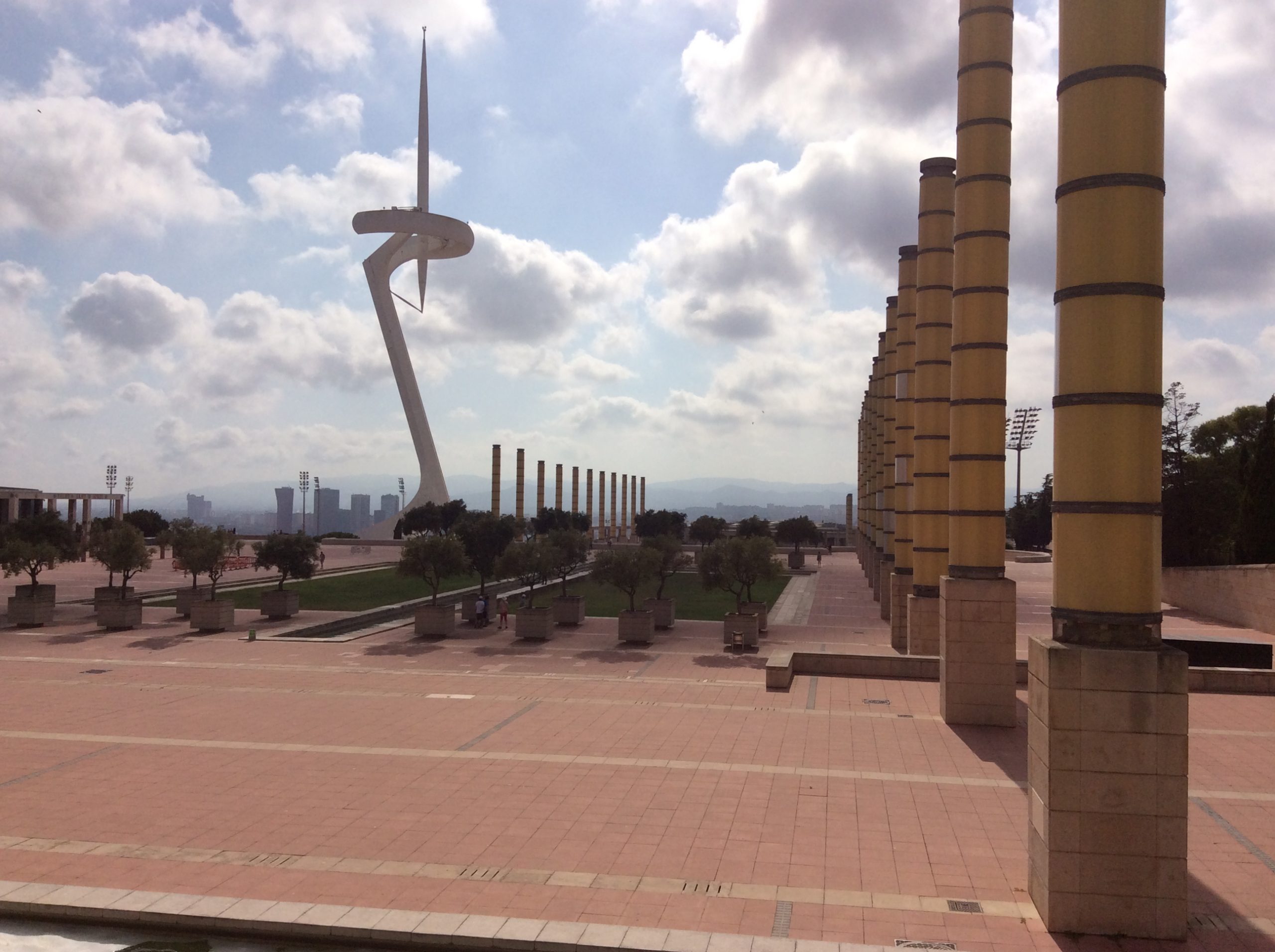
View of Barcelona Olympic Park
Photo credit – Margaret Roberts
Barcelona 1992 reality check
After the financial crisis of 2009, the Euro crisis with its austerity policies and a decade of economic crisis and stagnation, high levels of unemployment and political instability, it is perhaps time to look back and analyse the Olympic Games again not to deny its success, which is hardly deniable, but to see to what extent that was a true reflection of Spain and its future or was actually a kind of mirage. For this, we will review the lessons of Barcelona 92 that we have just synthesized to carry out a reality check of each one of those successes.
Spanish modernization derailed
Of all the achievements of Barcelona 92 undoubtedly the most significant and the one that seemed to change in depth the country’s economic model and its cultural and ideological framework was the definitive, and forever longed for, modernization. What Spain had been trying for a century or so was to regain its place at the European consensus, and in 1992, we were finally Europeans. As we have said, it was a two-way Europeanization: economic Europeanization, after the failed industrialization of the nineteenth century, and political Europeanization, leaving behind crony capitalism and endemic corruption.[17]
As for the economic transformation, the first years after the Olympic Games saw strong economic growth, falling unemployment rates and economic internationalization thanks to the landing in Latin America of a group of newly created national champions formed out of former public monopolies. The robust economic growth meant that Spain surpassed Italy in nominal GDP and its Presidents requested their entry into the G7.[18] Unfortunately, the implosion of the financial crisis after the fall of Lehman Brothers in 2007 showed that in fact a large part of the Spanish miracle was based on an international credit bubble that had been fattening one of the biggest real estate bubbles in the world. The hangover left the country with one of the highest structural unemployment rates in Europe and an economy heavily dependent on external debt and tourism, a sector characterized by poor quality employment.[19]
As for the alleged Europeanization of political elites, the bursting of the housing bubble revealed a deep network of political corruption in which parties exchanged illegal donations in exchange for public contracts, at local, regional and national levels. At present, five former regional presidents have been accused of corruption, one has been already condemned and, in what is probably the most serious case of corruption of the democratic period, the conservative party, Popular Party (PP) has been condemned and its leaders accused of receiving systematic payments in exchange of public contracts, including ministers and possibly former Spain’s prime minister, Mariano Rajoy.[20]
All this has considerably reduced the public’s confidence in the degree of Europeanization of Spanish politics and economy, and the country now seems doomed to a perennially failed modernization. To make things harder, confidence in the European project in one of the most pro-European countries in the EU has been partially broken by the imposed austerity policies and by the realization that the Spanish credit bubble would not have been possible without the easy access to credit from the European bank system.[21] This resulted in a crisis of modernization and crisis of purpose, because the European horizon no longer seems the mobilizing project that was in the eighties, but an insensitive bureaucracy with deep democratic deficits.
Transición culture in crisis
Having lost any confidence in the Spanish economic miracle and among widespread political corruption, the only positive point remained the exemplary transition from dictatorship to democracy, a demonstration of forgiveness and reconciliation that, we were told, was studied in universities all over the world.
In fact, the transition was not as peaceful as it seemed – there were hundreds of deaths between 1975 and 1982 – and the reconciliation was possible only with some political price. The most critical being the absence of any avowal of responsibilities, whether criminal or symbolic, from the Francoist establishment who had led the murderous repression after their victory in the civil war and the subsequent victimization of political opponents for decades. There was no restorative justice whatsoever, and the Francoist political class was incorporated into democratic life without any act of contrition, along with the Francoist police and the judiciary, and of course the economic elites.[22]
As a result, a narrow democratic consensus was built, in which many issues were left out, like the monarchy or the Catalonian referendum. An even more disturbing by-product was the absence of a clear rupture from Franco regime in the conservative Partido Popular (PP).[23] This passive acceptance of the dictatorship legacy may explain a Spanish anomaly: Partido Popular and liberal party Ciudadanos accepted the support of extreme-right party VOX in Andalucía region in April 2019 to form a government. It was the first time the extreme-right had any parliamentary representation in Spain and instead of supporting policies of non-cooperation with the extreme-right or taking years to whitewash and legitimize these formations, the Conservatives and the Liberals accepted their votes only a few weeks after their first electoral success. The agreements were replicated a few months later in tens of cities after the local elections.[24] The ‘exemplary’ Spanish democracy still has remnants of its past.
Doping and the Spaniards
The sporting success of the Spanish delegation is perhaps the most indisputable of all. Going from 26 medals in 100 years to 22 medals in a single edition of the Games is remarkable. The Spanish miracle was possible thanks to a lot of enthusiasm, the emotional advantage of competing at home, and vast resources made available for the first time to athletes up to then forgotten by public policies in a country which turned its back on everything that was not football. However, it is possible that the resources put at the disposal of Spanish sport were somewhat excessive.
The need for modernization of Spanish sport had been clearly identified by Spanish policy makers. In 1988, before the fall of the wall, the then president of the highest Spanish sports body, the Superior Council of Sports (CSD), Social Democrat Javier Gómez Navarro, had said that Spain needed laboratories such as those of the German Democratic Republic.[25] The ADO Plan actually bought a biomedical unit but we do not know what kind of material was acquired. We do know that one of the doctors in charge of the biomedical department was Nicolás Terrados.[26] He continued his career as a sport physician at the cycling team ONCE in the nineties, including the 1998 Tour de France, under Manolo Saiz leadership, one of the cycling managers heavily involved in the Puerto affaire.[27]
Spain’s commitment to elite sport coincided with the fall of communism in 1989 and some of the best coaches from other side of the iron curtain were hired by the Spanish government. Among those who arrived were the coaches of the Spanish Olympic cycling team, soviet Genari Gorounov and Alexandre Nizhegodtsev. Under their command, two cyclists tested positive during doping controls in that team. The first was José Manuel Moreno, future gold medallist in Barcelona ’92, who was later cleared due to formal defects in testing.[28] The second, was the young and unknown Josep Taradellas, who not only denied the accusations, but decided to abandon cycling in the face of what he felt was an absence of explanations by the coaching staff and the doctors.[29] The press reported him saying ‘I want to know what they have given me’.[30] The team denied the accusations, the federation supported the coaches and nobody heard anything about that athlete again. The doctor of that team had been Jesús Losa, accused years later of doping activities.[31] In 2019, a journalistic inquiry found proof of the Spanish Olympic cycling team hiring the doping celebrity Michelle Ferrari for the 1996 Atlanta Olympic Games.[32] Over the years, besides Nicolás Terrados, Doctor Sabino Padilla was accused of doping the footballer Carlos Gurpegui;[33] Luis García Del Moral and Pedro Celaya appeared in the USADA report over Lance Armstrong doping practices; and last but not least, Eufemiano Fuentes was the head of Operation Puerto,[34] one of the greatest doping scandals. Spanish doctors seem to have a profound knowledge of effective doping practices, most of them starting in the nineties, and Spanish authorities tend to privilege a nationalist stand when facing doping accusations.[35]
Barcelona’s touristification hell
Finally, we must talk about the successful urban renewal of Barcelona. The opening of the city to the sea transformed the social life and improved leisure and transportation in the city. Thanks to newly constructed iconic buildings and the promotion boost of the Olympics, Barcelona became one of the favourite destinations of international tourism and one of the most economically dynamic cities. However, Barcelona’s tourism success has finally become a problem. The service economy of Barcelona is not based on high-added value services, like biotechnology or big data, but on tourism. The gradual process of touristification and gentrification of the city has reached a critical point in recent years with the arrival of the companies of collaborative economy and holyday rentals. The impact of Airbnb and others has increased rentals 66.6% from 2013 to 2017.[36] The degradation of the city because of tourism was the main point in leftist Ada Colau’s campaign, and her first measure after taking office was a moratorium on hotel licenses.[37] The growth of Barcelona has turned out to be unbalanced and unequal, probably the most unexpected and paradoxical consequence of those Games.[38]
Conclusion
The Olympic Games in Barcelona are one of the few games of the last forty years that have, in the eyes of public opinion, left an exemplary social, sporting and urban legacy. A legacy certainly different from the 2004 Games that led to the ruin of Greece, and that of Rio 2016, full of social unrest and abandoned facilities. It is true that Barcelona ’92 allowed an urban regeneration and a new sports policy in Spain. Spanish democracy is now also comparable to the rest of European democracies and infinitely better than the National-Catholic dictatorship of General Franco. However, it is still true that the structural weaknesses of a project based on political amnesia and neoliberal modernization are clearly visible.
References
[1] For example, the opening phrase in the article about the 1992 Olympic Games of the Encyclopedia Britannica online version states: ‘The 1992 Games were perhaps the most-successful modern Olympics’. ‘Barcelona 1992 Olympic Games’, Encyclopaedia Britannica, 2019.
[2] The climax of the construction issues were the water leaks at the inauguration of the Olympic Stadium at the World Athletic Coup on September 9, 1989. See for example M.A. Santos, ‘La Ceremonia de La Confusión’, El Mundo Deportivo, 9 September 1989.
[3] Miquel De Moragas, ‘La Cultura Mediterránea En Los Juegos Olímpicos de Barcelona’ 92’ (Barcelona, 1993).
[4] Jesús J. Sebastián Llorente, ‘La Idea De Europa De Ortega Y Gasset’, Revista de Estudios Políticos 83 (1994): 221–45.
[5] Carles Sirera Miralles, ‘Neglecting the 19th Century: Democracy, the Consensus Trap and Modernization Theory in Spain’, History of the Human Sciences 28, no. 3 (20 July 2015): 51–67.
[6] The show was created by the Catalonian comedy group Els Joglars and aired on Spanish public television on November 4th, 1989. See Rosana Torres, ‘Albert Boadella Presentó Anoche Su ‘Sarcástica’ Serie’, El País, 31 October 1989.
[7] John Hargreaves, Freedom for Catalonia? Catalan Nationalism, Spanish Identity and the Barcelona Olympic Games (Cambridge: Cambridge University Press, 2000).
[8] Joan Botella, ‘Los Juegos Políticos. Actores y Estrategias En Torno a Los Juegos Olímpicos de Barcelona 1992’, in Las Claves Del Éxito1, ed. Miquel de Moragas and Miquel Botella (Barcelona: Universidad Autónoma de Barcelona, 1996), 177–87.
[9] For an overview of the democratic transition, see for example Javier Tusell, La Transición a La Democracia (España, 1975-1982) (Madrid: Espasa-Calpe, 2007); Álvaro Soto Carmona, Transición y Cambio En España: 1975-1996 (Madrid: Alianza Editorial, 2005).
[10] Falange was the dictatorship’s official party and the only one legal during that time.
[11] Juan Antonio Simón, ‘El Mundial de Fútbol de 1982: Escaparate de La Nueva Democracia Española= The World Cup 1982: A Showcase of the Spain’s New Democracy’, Materiales Para La Historia Del Deporte 10 (2012): 87–104.
[12] In 1982 there were active the Basque separatist terrorist group ETA, the extreme-left terrorist group GRAPO and the government death-squads Batallón Vasco-Español.
[13] Manuel Llanos, ‘Así Colaboró El Comité Olímpico Español En El Éxito Del 92’, in Las Claves Del Éxito, ed. Miquel de Moragas and Miquel Botella (Barcelona: Universidad Autónoma de Barcelona, 1996), 68–87.
[14] Botella, ‘Los Juegos Políticos. Actores y Estrategias En Torno a Los Juegos Olímpicos de Barcelona 1992’.
[15] Lluis Millet i Serra, ‘Los Juegos de La Ciudad’, in Las Claves Del Éxito, ed. Miquel de Moragas and Miquel Botella (Barcelona: Universidad Autónoma de Barcelona, 1996), 232–49.
[16] Pere Duran, ‘Turisme: Els Impact Del Jocs i de La Seva Imatge Sobre El Turisme’, in Barcelona: L’herència Dels Jocs, ed. Miquel de Moragas and Miquel Botella (Barcelona: Editorial Planeta, 2002), 275–94.
[17] Crony capitalism and corruption were widespread during both the Francoist dictatorship (1939-1975) and the monarchic period (1874-1931) where local political leaders controlled the elections through political patronage.
[18] Ana Carbajosa, ‘España Supera Por Primera Vez a Italia En Riqueza Por Habitante’, El País, 18 December 2007.
[19] Antonio Martín Sanabria and Bibiana García Medialdea, ‘Lending Calling. Recession by over-Indebtedness: Description and Specific Features of the Spanish Case’, Panoeconomicus 63, no. 2 (2016): 195–210, https://doi.org/10.2298/PAN1602195M.
[20] Fernando J. Pérez, ‘Governing Popular Party and Its Ex-Treasurer, Sentenced in Massive Corruption Case’, El País, 24 May 2018.
[21] In the last Eurobarometer, 69% of Spaniards thought Spain membership was a good thing generally speaking, but only 42% considered that their voice counted in the EU. See European Parliament, ‘Spring Eurobarometer 2019. Closer To the Citizens, Closer To the Ballot’ (Brussels, 2019).
[22] For a critical reprisal of La Transición see Juan Carlos Monedero, La Transición Contada a Nuestro Padres (Madrid: Catarata, 2017); Guillem Martínez, CT o La Cultura de La Transición (Barcelona: Debolsillo, 2012).
[23] The Partido Popular has refused several times to condemn Francoism, the last time in 2018. See Alejandro Torrús, ‘PP y Ciudadanos No Se Suman a La Condena Del Franquismo Aprobada Por El Senado’, Público, 21 November 2018.
[24] Sam Jones, ‘Spanish Parties Enlist Support of Far-Right Vox to Control Madrid’, The Guardian, 15 June 2019.
[25] Juan Mora, ‘Gómez Navarro Quería Unos Laboratorios ‘Tipo RDA’’, El País1, 13 October 1988.
[26] ‘ADO: Un Proyecto Único’ (Madrid, 1993).
[27] José Lui Barbería, ‘El Tour Castiga Al ONCE Con La Exclusión de Saiz y Del Médico Del Equipo’, El País, 17 June 1999.
[28] ‘La UCI Rehabilita a Moreno de Su Caso de ‘Doping’’, El País, 28 November 1991.
[29] ‘Tarradellas, Del ADO, Abandona El Ciclismo Porque Dice Que Le Han ‘Dopado’’, El País, 27 November 1991.
[30] Robert Álvarez and Rafael Carbonell, ‘El Presidente de La Federación Catalana Denuncia Cuatro Casos Más y La Existencia de Una Mano Negra’, El País, 21 September 1991.
[31] Carlos Arribas, ‘La Fallida Investigación a Jesús Losa’, El País, 20 October 2009.
[32] Carlos Arribas, ‘La Federación de Ciclismo Fichó Al Doctor Ferrari Para Dopar Al Equipo de Pista En Atlanta 96’, El País, 17 April 2018.
[33] Eduardo Rodrigálvarez, ‘La Enésima Batalla’, El País, 16 December 2000.
[34] Carlos Arribas, ‘El Juez Entrega Las Bolsas Pero Absuelve a Eufemiano y Labarta’, El País, 15 June 2016.
[35] Rodrigo Pardo and Dominique Bodin, ‘Análisis de Prensa de Los Casos de Dopaje de Marta Domínguez y Alberto Contador: ¿héroes o Villanos?’, Historia y Comunicacion Social 17 (2012): 297–316.
[36] idealista.com, main real state Spanish webpage shows mean price went from 11.6 euros/m2 to 17.5. Natalia Bravo, ‘Así Ha Evolucionado El Alquiler En Barcelona En Los Últimos Diez Años’, idealista.com, 2018 www.idealista.com/news/inmobiliario/vivienda/2018/03/01/764561-asi-ha-evolucionado-el-alquiler-en-barcelona-en-los-ultimos-diez-anos.
[37] Clara Blanchar, ‘Barcelona Mayor Introduces One-Year Ban on New Tourist Accommodation’, El País, 2 July 2015.
[38] Horacio Capel Saez, ‘¿En Qué Ha Fallado Barcelona?’, Finisterra, XLV, 90 XLV, no. 90 (2010): 173–204.

